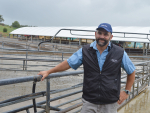Falling global dairy prices, dry conditions and high input costs are tightening the margins for Australia's dairy farmers and reducing national milk production.
According to Dairy Australia's latest Situation and Outlook report, released this month, supply and demand on the international front remains out of balance. Increased northern hemisphere production is outweighing any recovery in global demand, forcing international commodity prices lower.
Dairy Australia Industry analyst John Droppert says the stable domestic market and a more favourable exchange rate were helping to buffer the impact of declining world prices, high input costs and the dry season.
"The Australian market has remained a steady outlet for well over half of the industry's milk," Droppert says.
"Supermarket sales of dairy spreads continue to grow strongly, while milk, cheese and yoghurt sales are steadier."
However, Dairy Australia is expecting an overall drop in milk production for 2015-16 after a slow spring and summer. The national volume was down 0.2% for the season at the end of December.
"Elevated prices for grain and hay, combined with lower milk prices, have reduced the incentive for farmers to draw on alternative feed sources to maintain or grow production," says Droppert.
"An average autumn could see volumes prove more resilient later in the season, but even a recovery through this period would be too late to offset low production volumes in spring and summer.
"However, lower milk flows have given Australian processors room to move in adjusting their product mix to optimise returns in response to lower commodity prices."
While southern hemisphere exporters are seeing milk production slow, growth in the northern hemisphere is persisting, particularly in Europe.
Droppert says recovery on the global front was unlikely in the near future with the upcoming spring production in the northern hemisphere and ongoing sluggish demand from key markets.
"Continuing supply growth is the key factor keeping the market depressed, but prices are ultimately a function of the supply/demand balance and dairy demand hasn't kept pace," Droppert says.
"In recent months, growth in global demand has been relatively small and trending slower as inventories have built up. Exports to the Middle East and China have eased. However, many Southeast Asian countries continue to stock up on relatively affordable products and global exports to Japan have shown their strongest growth in years."


















